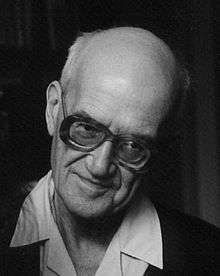Mikhail Gasparov
Mikhail Leonovich Gasparov (Russian: Михаи́л Лео́нович Гаспа́ров, April 13, 1935 in Moscow – November 7, 2005 in Moscow) was a Russian philologist and translator, renowned for his studies in classical philology and the history of versification, and a member of the informal Tartu-Moscow Semiotic School. He graduated from Moscow State University in 1957 and worked at the Gorky Institute of World Literature, the Russian State University for the Humanities, and the Russian Language Institute in Moscow. In 1992 Gasparov was elected a full member of the Russian Academy of Science.[1]

In 1995 Mikhail Gasparov was awarded the State Prize of the Russian Federation.
In 1997 he shared the Little Booker Prize with Aleksandr Goldstein for their publications analysing Russian literature from a historical-philosophical point of view.[2]
In 1999 Gasparov was awarded the Andrei Bely Prize for his essay collection Notes and excerpts (Russian: Записи и выписки).[3][4] Gasparov was also a poet. He published translations of classical and modern European poetry, yet only one of his own poems was published during his lifetime.[3]
Gasparov was a member of the editorial board of Literary Monuments (Russian: Литературные памятники) book series, journals Journal of Ancient History (Russian: Вестник древней истории), Literary Research (Russian: Литературоведение), Elementa (United States), and Rossica Romana (Italy).[5]
Mikhail Gasparov published about 300 articles, translations and other works, including the monographs Fable in Antiquity (Russian: Античная литературная басня, 1971), Modern Russian Versification (Russian: Современный русский стих. Метрика и ритмика, 1974), Overview of the History of Russian Versification (Russian: Очерк истории русского стиха: Метрика, ритмика, рифма, строфика, 1984), Overview of the History of European Versification (Russian: Очерк истории европейского стиха, 1989).[6]
During his last years Gasparov was actively engaged in publishing the collected works of the Russian poet Osip Mandelstam.[6]
Commemorating Mikhail Gasparov, the Russian State University for the Humanities organises annual conferences dedicated to the main fields of Gasparov's academic research -- classical philology and Russian literature of the 19th and early 20th centuries.[7]
Publications
- Gasparov M. L. A History of European Versification (transl. by G. S. Smith & Marina Tarlinskaja). Oxford: Clarendon Press, 1996. ISBN 0-19-815879-3.
- West, M. L. Review of A History of European Versification by M. L. Gasparov; G. S. Smith; M. Tarlinskaja. The Classical Review, New Series, Vol. 47, No. 2 (1997), pp. 431-432.
- Pensom, Roger. Review of A History of European Versification by M. L. Gasparov; G. S. Smith; M. Tarlinskaya. The Modern Language Review, Vol. 94, No. 1 (Jan., 1999), pp. 284-285.
References
- "Умер филолог Михаил Гаспаров" (in Russian). November 7, 2005.
- Shneidman, N. N. (2004). Russian Literature, 1995–2002: On the Threshold of the New Millenniu. University of Toronto Press. pp. 21–22. ISBN 0-8020-8670-5. Retrieved 2008-09-05.
- "Summary". Нло: Независимый Филологический Журнал (82). 2000. Retrieved 2008-09-05.
- http://www.guelman.ru/slava/beliy/laur1978-2001.htm Лауреаты Премии Андрея Белого
- "Archived copy". Archived from the original on 2007-08-09. Retrieved 2008-09-06.CS1 maint: archived copy as title (link) Гаспаров Михаил Леонович (1935 – 2005)
- В Москве скончался литературовед и филолог Михаил Гаспаров (in Russian). Lenta.ru. November 7, 2005. Retrieved 2008-09-06.
- http://www.litkarta.ru/russia/moscow/persons/gasparov-m/ Михаил ГАСПАРОВ – Биография
External links
- From Gasparov's book Записи и выписки
- Wachtel, Michael (2006). Mikhail Leonovich Gasparov (13 April 1935-7 November 2005). Slavonica 12 (1), 73-76.
- Brief memorial by Marina Tarlinskaja, friend, colleague, and translator